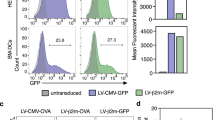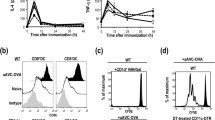Abstract
Since transfection of dendritic cells (DC) plays a key role in DNA vaccination, in vivo expansion of DC might be a tool to increase vaccine efficacy. We asked whether Fms-like tyrosine kinase-3 ligand (Flt-3L), a growth factor for DC, can be used as an adjuvant for DNA vaccination. Beta-galactosidase (β-gal) was used as a model antigen in C57BL/6 mice. Mice were immunized i.m. with DNA coding for β-gal with or without additional injection of Flt-3L. In both cases, antigen-specific CD4+ and CD8+ T cells were detectable after vaccination. Compared with DNA alone, additional administration of Flt-3L led to a significant increase in the antigen-specific proliferative response. However, increased cytotoxicity by T cells was not observed. The cytokines secreted by splenocytes of immunized mice upon in vitro stimulation with antigen had a TH2 profile. Humoral responses against β-gal preferentially consisted of IgG1 antibodies. Analysis of DC from Flt-3L-treated mice revealed an immature phenotype with low or absent expression levels of CD80, CD86 and CD40. We conclude that Flt-3L does not generally skew immune responses towards a TH1 type. More likely, factors determined by the antigen and/or the vaccination procedure itself are crucial for the resulting type of immune response. Flt-3L – under circumstances such as the one we have investigated – can also lead to suppression of TH1 T cell immunity, possibly by expansion of immature/unactivated DC.









Similar content being viewed by others
References
Condon C et al. DNA-based immunization by in vivo transfection of dendritic cells. Nat Med 1996; 2: 1122–1128.
Gurunathan S, Klinman DM, Seder RA . DNA Vaccines: immunology, application and optimization. Ann Rev Immunol 2000; 18: 927–974.
Scheerlinck JY . Genetic adjuvants for DNA vaccines. Vaccine 2001; 19: 2647–2656.
Gilliland DG, Griffin JD . The roles of FLT3 in hematopoiesis and leukemia. Blood 2002; 100: 1532–1542.
Maraskovsky E et al. Dramatic increase in the numbers of functionally mature dendritic cells in Flt3 ligand-treated mice: multiple dendritic cell subpopulations identified. J Exp Med 1996; 184: 1953–1962.
Maraskovsky E et al. In vivo generation of human dendritic cell subsets by Flt3 ligand. Blood 2000; 96: 878–884.
Oughton JA, Kerkvliet NL . Novel phenotype associated with in vivo activated CTL. Clin Immunol 1999; 90: 323–333.
Inaba K et al. Generation of large numbers of dendritic cells from mouse bone marrow cultures supplemented with granulocyte/macrophage colony-stimulating factor. J Exp Med 1992; 176: 1693–1702.
Schuler G, Schuler-Thurner B, Steinman RM . The use of dendritic cells in cancer immunotherapy. Curr Opin Immunol 2003; 15: 138–147.
Doe B et al. Induction of cytotoxic T lymphocytes by intramuscular immunization with plasmid DNA is facilitated by bone marrow-derived cells. Proc Natl Acad Sci USA 1996; 57: 873–883.
Casares S et al. Antigen presentation by dendritic cells after immunization with DNA encoding a major histocompatibility complex class II-restricted viral epitope. J Exp Med 1997; 186: 1481–1486.
Porgador A et al. Predominant role for directly transfected dendritic cells in antigen presentation to CD8+ T cells after gene gun immunization. J Exp Med 1998; 188: 1075–1082.
Zöller M, Christ O . Prophylactic tumor vaccination: comparison of effector mechanisms initiated by protein versus DNA vaccination. J Immunol 2001; 166: 3440–3450.
Sun X et al. Co-expression of granulocyte–macrophage colony-stimulating factor with antigen enhances humoral and tumor immunity after DNA vaccination. Vaccine 2002; 20: 1466–1474.
Parajuli P et al. Immunization with wild-type p53 gene sequences coadministered with Flt3 ligand induces an antigen-specific type 1 T-cell response. Cancer Res 2001; 61: 8227–8234.
Moser M . Dendritic cells in immunity and tolerance – do they display opposite functions? Immunity 2003; 19: 5–8.
Lynch DH et al. Flt3 ligand induces tumor regression and antitumor immune responses in vivo. Nat Med 1997; 3: 625–631.
Pawlowska AB et al. In vitro tumor-pulsed or in vivo Flt3 ligand-generated dendritic cells provide protection against acute myelogenous leukemia in nontransplanted or syngeneic bone marrow-transplanted mice. Blood 2001; 97: 1474–1482.
Braun SE et al. Flt3 ligand antitumor activity in a murine breast cancer model: a comparison with granulocyte–macrophage colony-stimulating factor and a potential mechanism of action. Hum Gene Ther 1999; 10: 2141–2151.
Hung CF et al. Enhancement of DNA vaccine potency by linkage of antigen gene to a gene encoding the extracellular domain of fms-like tyrosine kinase 3-ligand. Cancer Res 2001; 61: 1080–1088.
Fong CL, Hui KM . Generation of potent and specific cellular immune responses via in vivo stimulation of dendritic cells by pNGVL3-hFLex plasmid DNA and immunogenic peptides. Gene Therapy 2002; 9: 1127–1138.
Liu Y et al. Dendritic cells engineered to express the Flt3 ligand stimulate type I immune response, and induce enhanced cytotoxic T and natural killer cell cytotoxicities and antitumor immunity. J Gene Med 2003; 5: 668–680.
Smith JR, Thackray AM, Bujdoso R . Reduced herpes simplex virus type 1 latency in Flt-3 ligand-treated mice is associated with enhanced numbers of natural killer and dendritic cells. Immunology 2001; 102: 352–358.
Pulendran B et al. Prevention of peripheral tolerance by a dendritic cell growth factor: flt3 ligand as an adjuvant. J Exp Med 1998; 188: 2075–2082.
Kim EM, Sivanandham M, Stavropoulos CI, Wallack MK . Adjuvant effect of a Flt3 ligand (FL) gene-transduced xenogeneic cell line in a Murine Colon Cancer Model. J Surg Res 2002; 108: 148–156.
Kwon TK, Park JW . Intramuscular co-injection of naked DNA encoding HBV core antigen and Flt3 ligand suppresses anti-HBc antibody response. Immunol Lett 2002; 81: 229–234.
Evans TG, Hasan M, Galibert L, Caron D . The use of Flt3 ligand as an adjuvant for hepatitis B vaccination of healthy adults. Vaccine 2002; 21: 322–329.
McNeel DG et al. Pilot study of an HLA-A2 peptide vaccine using flt3 ligand as a systemic vaccine adjuvant. J Clin Immunol 2003; 23: 62–72.
Viney JL et al. Expanding dendritic cells in vivo enhances the induction of oral tolerance. J Immunol 1998; 160: 5815–5825.
Yunusov MY et al. FLT3 ligand promotes engraftment of allogeneic hematopoietic stem cells without significant graft-versus-host disease. Transplantation 2003; 75: 933–940.
Ciavarra RP et al. Impact of the tumor microenvironment on host infiltrating cells and the efficacy of Flt3-ligand combination immunotherapy evaluated in a treatment model of mouse prostate cancer. Cancer Immunol Immunother 2003; 52: 535–545.
Langenkamp A et al. Kinetics of dendritic cell activation: impact on priming of TH1, TH2 and nonpolarized cells. Nat Immunol 2000; 1: 311–316.
Boonstra A et al. Flexibility of mouse classical and plasmacytoid-derived dendritic cells in directing T helper type 1 and 2 cell development: dependency on antigen dose and differential toll-like receptor ligation. J Exp Med 2003; 197: 101–109.
George TC, Bilsborough J, Viney JL, Norment AM . High antigen dose and activated dendritic cells enable Th cells to escape regulatory T cell-mediated suppression in vitro. Eur J Immunol 2003; 33: 502–511.
Robinson HL . DNA vaccines: basic mechanisms and immune response. Int J Mol Med 1999; 4: 549–555.
Shivanthi P et al. The ability of murine dendritic cell subsets to direct T helper cell differentiation is dependent on microbial signals. Eur J Immunol 2003; 33: 101–107.
Merad M, Sugie T, Engleman EG, Fong L . In vivo manipulation of dendritic cells to induce therapeutic immunity. Blood 2002; 99: 1676–1682.
Sato M, Iwakabe K, Kimura S, Nishimura T . Functional skewing of bone marrow-derived dendritic cells by Th1- or Th2-inducing cytokines. Immunol Lett 1999; 67: 63–68.
Mosca PJ et al. Multiple signals are required for maturation of human dendritic cells mobilized in vivo with Flt3 ligand. J Leukocyte Biol 2002; 72: 546–553.
Author information
Authors and Affiliations
Rights and permissions
About this article
Cite this article
Westermann, J., Nguyen-Hoai, T., Mollweide, A. et al. Flt-3 ligand as adjuvant for DNA vaccination augments immune responses but does not skew TH1/TH2 polarization. Gene Ther 11, 1048–1056 (2004). https://doi.org/10.1038/sj.gt.3302261
Received:
Accepted:
Published:
Issue Date:
DOI: https://doi.org/10.1038/sj.gt.3302261
- Springer Nature Limited
Keywords
This article is cited by
-
Genetic co‐transfer of CCR7 ligands enhances immunity and prolongs survival against virulent challenge of pseudorabies virus
Immunology & Cell Biology (2009)
-
CCL19 (ELC) as an adjuvant for DNA vaccination: induction of a TH1-type T-cell response and enhancement of antitumor immunity
Cancer Gene Therapy (2007)
-
Intramuscular immunization with plasmid coexpressing tumour antigen and Flt-3L results in potent tumour regression
Gene Therapy (2006)
-
Murine mammary adenocarcinoma cells transfected with p53 and/or Flt3L induce antitumor immune responses
Cancer Gene Therapy (2005)




